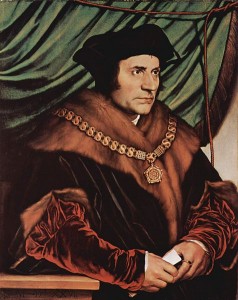 On 5th July 1535, the day before his execution, Sir Thomas More wrote to his beloved daughter Margaret Roper from his prison in the Tower of London. He had been found guilty of high treason at a special commission of oyer and terminer for refusing to recognise Henry VIII as Supreme Head of the Church in England and allegedly speaking against the King.
On 5th July 1535, the day before his execution, Sir Thomas More wrote to his beloved daughter Margaret Roper from his prison in the Tower of London. He had been found guilty of high treason at a special commission of oyer and terminer for refusing to recognise Henry VIII as Supreme Head of the Church in England and allegedly speaking against the King.
More wrote the letter in coal and it read:
“Our Lord bless you good daughter and your good husband and your little boy and all yours and all my children and all my godchildren and all our friends. Recommend me when you may to my good daughter Cecilye, whom I beseech our Lord to comfort, and I send her my blessing and to all her children and pray her to pray for me. I send her an handekercher and God comfort my good son her husband. My good daughter Daunce hath the picture in parchment that you delivered me from my Lady Coniers; her name is on the back side. Show her that I heartily pray her that you may send it in my name again for a token from me to pray for me.
I like special well Dorothy Coly, I pray you be good unto her. I would wit whether this be she that you wrote me of. If not I pray you be good to the other as you may in her afflic-tion and to my good daughter Joan Aleyn to give her I pray you some kind answer, for she sued hither to me this day to pray you be good to her.
I cumber you good Margaret much, but I would be sorry, if it should be any longer than tomorrow, for it is Saint Thomas even, and the Vtas of Saint Peter and therefore tomorrow long I to go to God, it were a day very meet and convenient for me. I never liked your manner toward me better than when you kissed me last for I love when daughterly love and dear charity hath no leisure to look to worldly courtesy.
Fare well my dear child and pray for me, and I shall for you and all your friends that we may merrily meet in heaven. I thank you for your great cost.
I send now unto my good daughter Clement her algorism stone and I send her and my good son and all hers God’s blessing and mine.
I pray you at time convenient recommend me to my good son John More. I liked well his natural fashion. Our Lord bless him and his good wife my loving daughter, to whom I pray him be good, as he hath great cause, and that if the land of mine come to his hand, he break not my will concerning his sister Daunce. And our Lord bless Thomas and Austen and all that they shall have.”
For those of you interested in Thomas More’s letter to his daughter, you can see a photo of it online at – http://www.luminarium.org/renlit/moremargaret.jpg. The original is in the Arundel MS (ref 152).
Notes and Sources
- The Last Letters of Thomas More, edited by Alvaro De Silva.